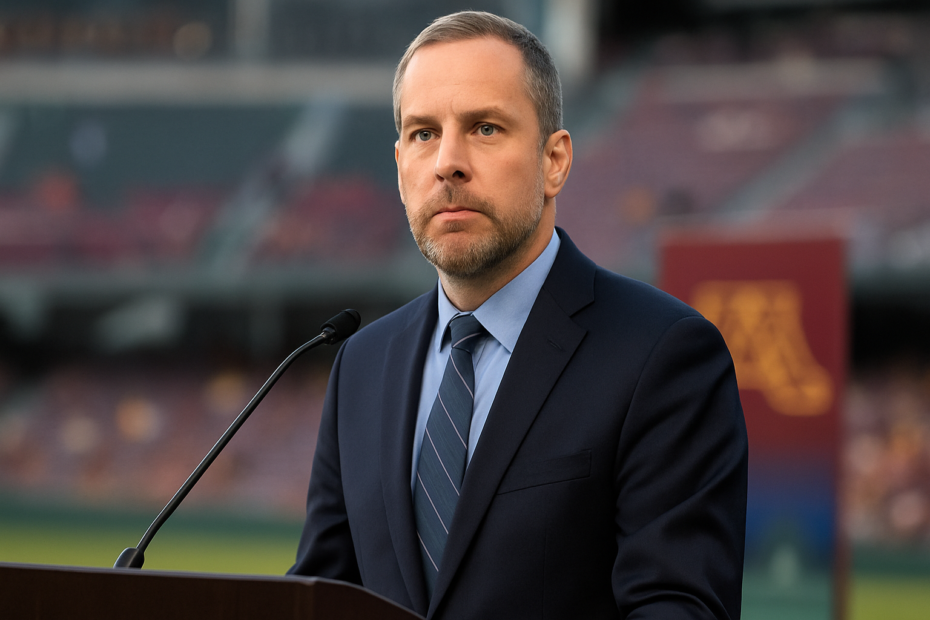Bryan Seeley, Top MLB Exec, to Lead New College Sports Commission as CEO
In a move set to shake up the landscape of college athletics, Bryan Seeley, a seasoned Major League Baseball (MLB) executive, has been appointed CEO of the newly formed College Sports Commission—a powerful body that may soon take a central role in regulating the future of NCAA sports.
The announcement marks a significant moment in the evolution of collegiate athletics, as the NCAA faces growing pressure from legal, financial, and political forces over issues like name, image, and likeness (NIL) rights, revenue sharing, and athlete welfare.
⚖️ Why This Matters: The New Power Player in College Sports
The College Sports Commission (CSC), supported by top university leaders and stakeholders, is being positioned as a central regulatory body to oversee and enforce rules across major college sports programs—functions once solely managed by the NCAA.
Bryan Seeley, a former federal prosecutor and MLB’s Executive Vice President of Investigations & Deputy General Counsel, brings with him a reputation for fairness, legal acumen, and deep experience in complex organizational structures. His appointment suggests the CSC is serious about restoring trust and building a more transparent framework for college athletics.
👤 Who Is Bryan Seeley?
Seeley has worn many hats throughout his career:
- A Harvard Law School graduate
- Former federal prosecutor in the U.S. Attorney’s Office
- Played a major role in MLB’s investigations and compliance, including overseeing integrity-related matters like sign-stealing scandals and player conduct cases
His blend of legal expertise and sports governance makes him uniquely qualified to lead an organization facing the immense challenge of regulating a rapidly evolving landscape.
🏛️ What Will the College Sports Commission Do?
According to early reports, the CSC will aim to:
- Set and enforce national standards around NIL activities
- Coordinate investigations into compliance violations
- Support athlete well-being, education, and compensation guidelines
- Streamline governance to reduce legal risk and ensure consistent rules across conferences
While the NCAA is still expected to play a role in championships and eligibility, the CSC could become the de facto authority on key policy issues—especially those now tied up in lawsuits or under federal scrutiny.
🧭 A Critical Time for Change
The college sports world is at a crossroads. With ongoing legal battles like House v. NCAA, new state-level NIL laws, and rising calls for athlete unionization, the need for structured, centralized oversight has never been more urgent.
The NCAA has long struggled to adapt to modern pressures. Critics say its system lacks transparency and is often reactive rather than proactive. Seeley’s appointment could help reestablish integrity and clarity in an industry under intense scrutiny.
🗣️ What Leaders Are Saying
University administrators and athletic directors have responded positively to the announcement.
“Bryan Seeley brings a rare combination of legal, investigative, and sports leadership experience,” said one Big Ten athletic director. “He’s exactly the type of leader we need to help unify and modernize college sports.”
Industry insiders believe Seeley’s track record with MLB gives him the credibility to navigate the delicate balance between athlete rights, institutional control, and legal compliance.
🔍 What’s Next?
With Seeley at the helm, the College Sports Commission is expected to begin rolling out operational frameworks within the coming months. Some initiatives may include:
- NIL agent registration systems
- National NIL contract database for transparency
- Education programs for high school and college athletes
- Policy coordination with Congress and state governments
The commission is also likely to collaborate with federal lawmakers to craft consistent standards across all 50 states—something the NCAA has failed to effectively accomplish on its own.
🔚 Final Thoughts
Bryan Seeley’s appointment marks a pivotal moment for college athletics. With vast legal and governance experience, he’s well-positioned to steer the College Sports Commission through what may be the most turbulent era in NCAA history.
For athletes, coaches, universities, and fans, this change offers a glimmer of hope: a chance for smarter, fairer, and more future-proof college sports.
Stay tuned. The CSC’s next moves could define the future of college athletics as we know it.
